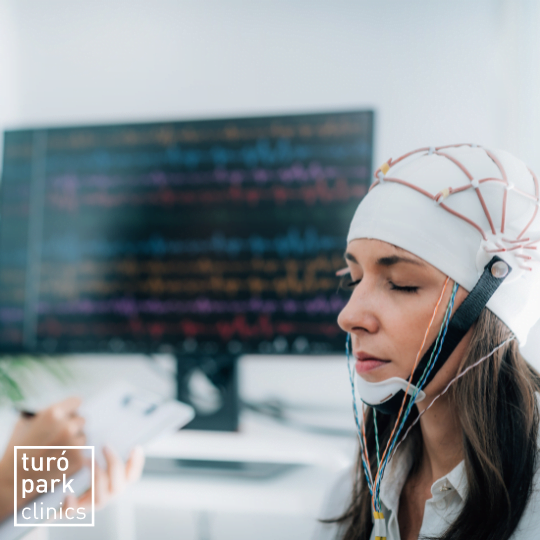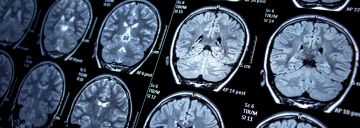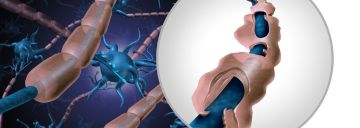Are you looking for a neurologist in Barcelona?
The neurologist is the physician who specializes in diseases of the nervous system.
If you suffer from migraines, sleep problems, memory problems, or a progressive disease such as Alzheimer's disease, Parkinson's disease, multiple sclerosis, amyotrophic lateral sclerosis (ALS or Charcot's disease) or epilepsy, do not hesitate to make an appointment with our neurologist.
Based on his or her clinical examination, your symptoms and your history, he or she may prescribe additional tests, including an electroencephalogram or a brain scan, in order to make a diagnosis and propose an appropriate treatment plan.
Fast track your treatment!
To book an appointment or speak with one of our friendly team, please get in touch using the options below.

Our neurology services
Treatment of migraines and headaches
More or less intense, of variable duration, and sometimes accompanied by other symptoms, migraines and headaches can be particularly disabling in everyday life.
Epilepsy
A neurological disorder that affects millions of people worldwide and can have a significant impact on their daily lives, routines and personal well-being.
Neuropathy
Having neuropathy means living with a debilitating condition that causes discomfort and symptoms like chronic pain, mobility and coordination problems, as well as fatigue and muscle weakness.
Sleep disorders
A sleep disorder can affect your overall health, safety and quality of life. Lack of sleep can affect your ability to drive safely and increase your risk of other health problems.
Multiple Sclerosis
MS is an autoimmune disease in which the immune system attacks myelin, the substance that coats and protects nerve fibres in the central nervous system.
Fibromyalgia and Chronic Fatigue
Fibromyalgia and chronic fatigue syndrome share symptoms such as extreme fatigue, widespread pain and cognitive problems, yet they are distinct diseases with different causes and characteristics.
Cognitive and memory disorders
These conditions affect essential functions of the brain. They vary in severity and can be mild, affecting only day-to-day living, or severe, limiting a person's independence.
Neurodegenerative diseases
They are characterised by cognitive impairment and they vary widely in the age of manifestation, hence why early detection and diagnosisis crucial.
Why consult a neurologist ?
In most cases, it is the general practitioner who refers his patient to a neurologist.
But you can also choose to use the neurologist directly. There is an indication to consult a neurologist in case of :
- persistent pain
- migraines
- epilepsy
- memory disorders
- sensory-motor disorders
- post-stroke follow-up
- progressive diseases (Alzheimer's, Parkinson's, Charcot's or multiple sclerosis).
Neurology is the medical specialty devoted to neurological diseases. It therefore deals with a wide range of pathologies such as :
- loss of consciousness
- epileptic seizures
- intellectual and memory deficits
- Alzheimer's disease and other dementias
- Parkinson's disease
- multiple sclerosis
- transient or lasting paralysis
- balance and gait disorders
- migraines
- facial neuralgia
- tremors
- brain tumors
- muscular pathologies such as myopathies or myasthenia (characterized by muscle weakness).
Your health is our priority!
Our neurology department welcomes you for the diagnosis and treatment of all your neurological problems.

How does a consultation with a neurologist work?
A neurology consultation usually lasts between 45 minutes and 1.5 hours. The neurologist first interviews the patient with basic questions (age, treatments, history, profession...) and then proceeds with the examination according to the symptoms described.
The neurologist can examine the motor plan in particular. These tests analyze the strength of the patient's muscles:
- Barré's, Mingazzini's and Barré's maneuvers on the upper limbs : they allow to check if the patient has a possible motor deficit.
- Muscle testing : muscle tone is estimated by passively mobilizing the limbs.
- Osteotendinous reflexes : with a reflex hammer, the neurologist hits the patient's tendon. He then observes the response of the muscles.
- Cranial nerve tests : the neurologist asks the patient to perform a few movement tests.
Once the examination of the motor plane is completed, the practitioner assesses the patient's sensitivity. For this part, the four limbs, the trunk and the face are gauged. The neurologist asks questions about how the patient feels when he touches him or tries to mobilize a part of his body.
Another step in the neurological consultation is the visual field study. The patient stares at the neurologist's nose. The examiner waves two fingers in the four quadrants of the visual field so that the patient catches them while they are in motion. This exercise reveals a homonymous lateral hemianopia, a left or right amputation of the visual field. The practitioner can also test memory and orientation in time and space.
How to prepare for a neurology consultation?
Before going to the appointment with a neurologist, it is important to bring recent prescriptions and any X-rays, scans or MRIs that have been done.
No preparation is necessary.
Our multilingual neurologist








